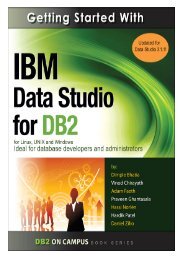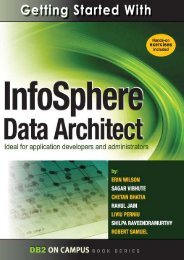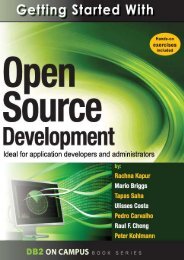Getting Started with Open Source Development
You also want an ePaper? Increase the reach of your titles
YUMPU automatically turns print PDFs into web optimized ePapers that Google loves.
46 <strong>Getting</strong> started <strong>with</strong> open source development<br />
3.2.2 Commonly used open source licenses<br />
Though there are over 50 OSI approved licenses most of the licenses fall under two<br />
categories:<br />
• Academic licenses, such as the Berkeley Software Distribution (BSD) license,<br />
allow software to be used for any purpose. Software obtained via an academic<br />
license can be freely changed, sold, redistributed, sublicensed, and combined <strong>with</strong><br />
other software.<br />
• Reciprocal licenses like the GNU General Public License (GPL), also allow<br />
software to be used for any purpose, however it enforces that the changed or<br />
modified software must also be licensed under the exact terms as the original<br />
license.<br />
A GPL licensed code does not allow proprietary software to link to it. It also does not permit<br />
redistribution <strong>with</strong> software having a GPL non-compatible license. Also redistribution of the<br />
derivative works need to be <strong>with</strong> GPL. On the other hand MIT licensed software allows all<br />
of it. It permits proprietary code to link to it, redistribution <strong>with</strong> non-MIT license software and<br />
redistribution of derivative works <strong>with</strong> non-MIT license. Interestingly, they both are open<br />
source software licenses as they follow the open source definition specified by the OSI.<br />
Table 3.2 compares the GPL versus the MIT license.<br />
Allow proprietary code to<br />
link to open source code<br />
Allow redistribution of<br />
software <strong>with</strong> other code<br />
that has another license<br />
Allow redistribution of<br />
derivative work<br />
GPL license<br />
No<br />
No<br />
Yes. Derivative work becomes open<br />
source <strong>with</strong> GPL license<br />
MIT license<br />
Yes<br />
Yes<br />
Yes<br />
Table 3.2 - Comparing the GPL vs. the MIT reciprocal licenses<br />
Let's take an even closer look at the GPL and MIT licenses by reviewing excerpts of each<br />
license as shown in Listing 3.1 and 3.2 respectively. We will verify each of the licenses<br />
satisfy the five intentions explained earlier in Table 3.1<br />
You may modify your copy or copies of the Program or any portion of it, thus forming a work based<br />
on the Program, and copy and distribute such modifications or work -- provided that you -- cause any<br />
work that you distribute or publish, that in whole or in part contains or is derived from the Program or<br />
any part thereof, to be licensed as a whole at no charge to all third parties under the terms of this<br />
License.<br />
These requirements apply to the modified work as a whole. If identifiable sections of that work are not<br />
derived from the Program, and can be reasonably considered independent and separate works in<br />
themselves, then this License, and its terms, do not apply to those sections when you distribute them<br />
as separate works.

















